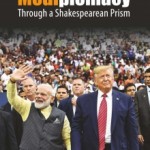Prime Minister Narendra Modi’s remarkable activism in external affairs has provided endless opportunities to critics and advocates to evaluate it. He had barely completed his first year in office when the first books on his foreign policy began to appear. But T.P. Sreenivasan wisely waited for the end of Modi’s first five-year term before producing Modiplomacy: Through a Shakespearean Prism. A definitive take on the subject is not due yet as Modi is likely to be in office for many more years. It is worth recalling that more than five decades after Jawaharlal Nehru’s departure, his foreign policy triggers passionate debate.
A veteran diplomat, prolific writer, and public speaker, Sreenivasan packages his analysis within the framework of a Shakespearean play — one with five acts that opens with an exposition, moves to complications, then to the climax, before presenting the reversals that pave the way for the denouement. Even readers without a specialised knowledge of Shakespearean drama will find the story fascinating. The author notes, “Narendra Modi is nothing if not theatrical.”
In five acts
Correspondingly, the first act opened with Modi’s grand swearing-in as PM in 2014. All leaders of South Asia and a few others attended it — a historic first. Then onward, there followed “a period of visibility, speech-making, vision-building, daydreaming, sloganeering, fashion-setting, innovating, positioning and promising change”. Among his many visits abroad — a “virtual odyssey across continents” — the visit to China (May 2015) was significant, a finale to the first year. Modi took with him “not only Nehru’s dream of Asian solidarity, but also Patel’s scepticism of China”. As attempts to build ties afresh with China and the neighbours ran into difficulty, Modi focused on strengthening cooperation with the U.S., first through Obama’s visit (January 2015) and then his own (in September of the same year).
The second act clarified the contours of ‘Modiplomacy’ and its ‘transactions approach’. Another outreach towards Pakistan was attempted via the meeting with Nawaz Sharif at Ufa (July 2015), but the India-Pakistan dialogue failed to take off. And turmoil in relations with Nepal came to the surface.
The third act was marked by noticeable progress in India-U.S. relations as Modi spoke of “a new symphony in play”. Modi’s next visit to the U.S. (June 2016) helped advance his priorities — development, security, neighbourhood and diaspora. Yet, hurdles remained, the greatest being New Delhi’s ‘wariness’ over U.S. support to Pakistan and American ‘concerns’ over close India-Russia relations.
The fourth act was mostly about coping with ‘the Trump Effect’. The author rightly judges that Modi did better than most other leaders in connecting with President Trump. However, New Delhi’s growing proximity to Washington cast a shadow over relations with Russia and complicated ties with China.
Disappointment with Trump led Modi to re-adjust India’s equations with China and Russia through informal summits with their leaders. Relations with Pakistan were marked by a continuous slide, with the terrorist attack in Pulwama and India’s robust air attack on Balakot. The events in the last act made Modi “strong domestically as well as internationally”, concludes the author.
‘Streak of overconfidence’
Sreenivasan defines Shakespearean heroes as full of many great qualities, but also with a few tragic flaws that cause their undoing. It was jealousy for Othello, ambition for Macbeth, vanity for King Lear and indecision for Hamlet. In Modi’s case, a ‘streak of overconfidence” and ‘illusions of grandeur’ are the tragic flaws.
This assessment of Modi’s foreign policy record is generally positive. The author, however, believes that India should not have abandoned its leadership of the Non-Aligned Movement.
Though he frankly concedes that Modiplomacy is “an impressionistic narrative of current history”, not a research treatise, it may be of considerable interest to students of international affairs. A timeline of major developments covered and a list of select readings would have been welcome additions.
Modiplomacy: Through a Shakespearean Prism by T.P. Sreenivasan (Konark Publishers, 2019)
Rajiv Bhatia is Distinguished Fellow, Foreign Policy Studies Programme, Gateway House, and a former Ambassador


